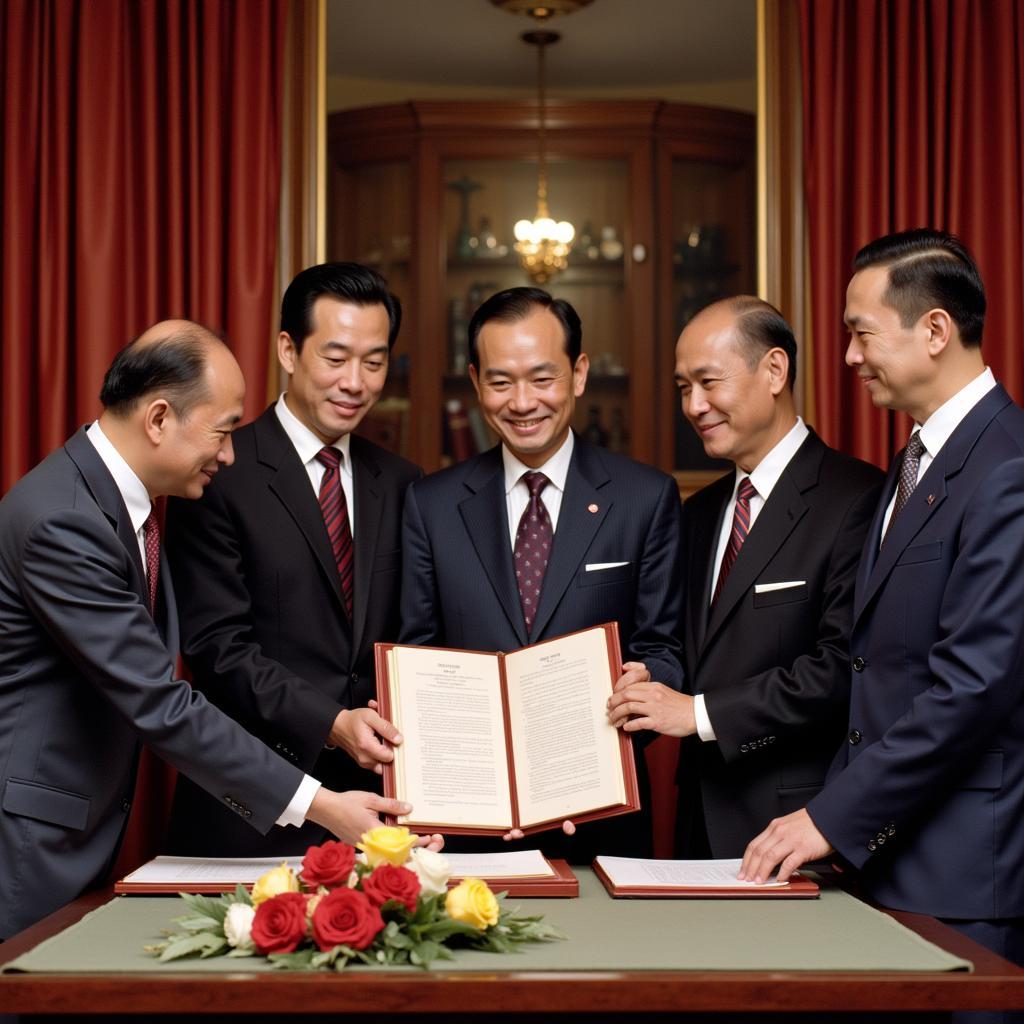The 2010 Protocol To The Asean Charter On Dispute Settlement Mechanisms is a crucial element of ASEAN’s legal framework, solidifying its commitment to peaceful conflict resolution within the region. This protocol clarifies and strengthens the dispute settlement mechanisms outlined in the ASEAN Charter, promoting stability and cooperation among member states. It addresses key aspects of dispute resolution, from consultations and negotiations to mediation and arbitration.
Understanding the Significance of the 2010 Protocol
The 2010 Protocol builds upon the foundation laid by the ASEAN Charter, providing more specific guidelines for managing inter-state disputes. This is vital for a region as diverse as Southeast Asia, where varying political systems, economic interests, and cultural norms can sometimes lead to friction. The protocol underscores ASEAN’s commitment to preventing disputes from escalating into conflicts, fostering an environment of trust and mutual respect. It aims to ensure that disagreements are addressed through peaceful means, contributing to the overall peace and prosperity of the region.
Key Provisions of the 2010 Protocol
The 2010 Protocol sets out a comprehensive framework for managing disputes, clarifying procedures and outlining the responsibilities of member states. Key provisions include:
- Consultations and Negotiations: The protocol emphasizes the importance of bilateral consultations as the first step in resolving disputes. This encourages open communication and direct engagement between the parties involved.
- Good Offices, Conciliation, and Mediation: If bilateral talks fail, the protocol provides options for third-party involvement through good offices, conciliation, or mediation. These processes can help facilitate communication and bridge differences between the disputing parties.
- Arbitration: For disputes involving the interpretation of the ASEAN Charter or agreements under it, the protocol allows for recourse to arbitration. This provides a more formal and legally binding mechanism for resolving complex disagreements.
- Panel of Experts: The protocol establishes a Panel of Experts to assist with dispute settlement proceedings. These experts provide technical and legal advice, ensuring that decisions are based on sound principles and international law.
Addressing Challenges and Ensuring Effective Implementation
While the 2010 Protocol represents a significant step forward, challenges remain in ensuring its effective implementation. Some of these include:
- Political Will: Successful dispute settlement requires a strong commitment from member states to abide by the protocol’s provisions. Political sensitivities can sometimes hinder the process.
- Capacity Building: Member states need adequate resources and expertise to effectively engage in dispute settlement processes. Training and technical assistance are essential to build capacity in this area.
- Enhancing Transparency: Greater transparency in dispute settlement proceedings can help build trust and confidence in the mechanism. Public access to information, where appropriate, can strengthen accountability.
How the 2010 Protocol Strengthens ASEAN
The 2010 Protocol plays a vital role in strengthening ASEAN’s overall architecture. It reinforces the organization’s commitment to:
- Maintaining Peace and Stability: By providing a clear framework for dispute resolution, the protocol helps prevent conflicts from erupting and destabilizing the region.
- Promoting Rule of Law: The protocol underscores the importance of adhering to agreed-upon rules and procedures, fostering a culture of respect for international law within ASEAN.
- Enhancing Regional Integration: Effective dispute settlement mechanisms are crucial for building trust and confidence among member states, facilitating deeper integration and cooperation in various fields.
“The 2010 Protocol is not just a legal document; it’s a testament to ASEAN’s commitment to peaceful coexistence and regional solidarity,” says Dr. Amelia Tan, a prominent expert on Southeast Asian international law. “By strengthening its dispute settlement mechanisms, ASEAN sends a powerful message that it is dedicated to resolving its differences through dialogue and diplomacy.”
The Future of Dispute Settlement in ASEAN
The 2010 Protocol is a living document, subject to review and amendment as needed. As ASEAN continues to evolve, the protocol must adapt to new challenges and opportunities. Ongoing efforts to strengthen the mechanism include:
- Reviewing and Updating the Protocol: Regular reviews are essential to ensure that the protocol remains relevant and effective in addressing emerging issues.
- Promoting Awareness and Understanding: Greater awareness among member states and the public about the protocol’s provisions can enhance its utilization.
- Strengthening the ASEAN Secretariat’s Role: The ASEAN Secretariat plays a crucial role in supporting dispute settlement processes. Enhancing its capacity can further improve the effectiveness of the mechanism.
In conclusion, the 2010 Protocol to the ASEAN Charter on Dispute Settlement Mechanisms is a critical instrument for promoting peace, stability, and cooperation within Southeast Asia. By providing a clear and comprehensive framework for resolving disputes, the protocol strengthens ASEAN’s legal architecture and reinforces its commitment to peaceful conflict resolution. While challenges remain, ongoing efforts to improve the mechanism will help ensure its effectiveness in addressing the evolving needs of the region.
FAQ
- What is the main purpose of the 2010 Protocol?
- How does the protocol contribute to regional stability?
- What are the key stages in the dispute settlement process?
- What role does the Panel of Experts play?
- How can the effectiveness of the protocol be improved?
- What are the future challenges for dispute settlement in ASEAN?
- Where can I find the full text of the 2010 Protocol?
Need support? Contact us 24/7: Phone: 0369020373, Email: [email protected], or visit us at: Thon Ngoc Lien, Hiep Hoa, Bac Giang, Vietnam. We have a dedicated customer support team ready to assist you.

